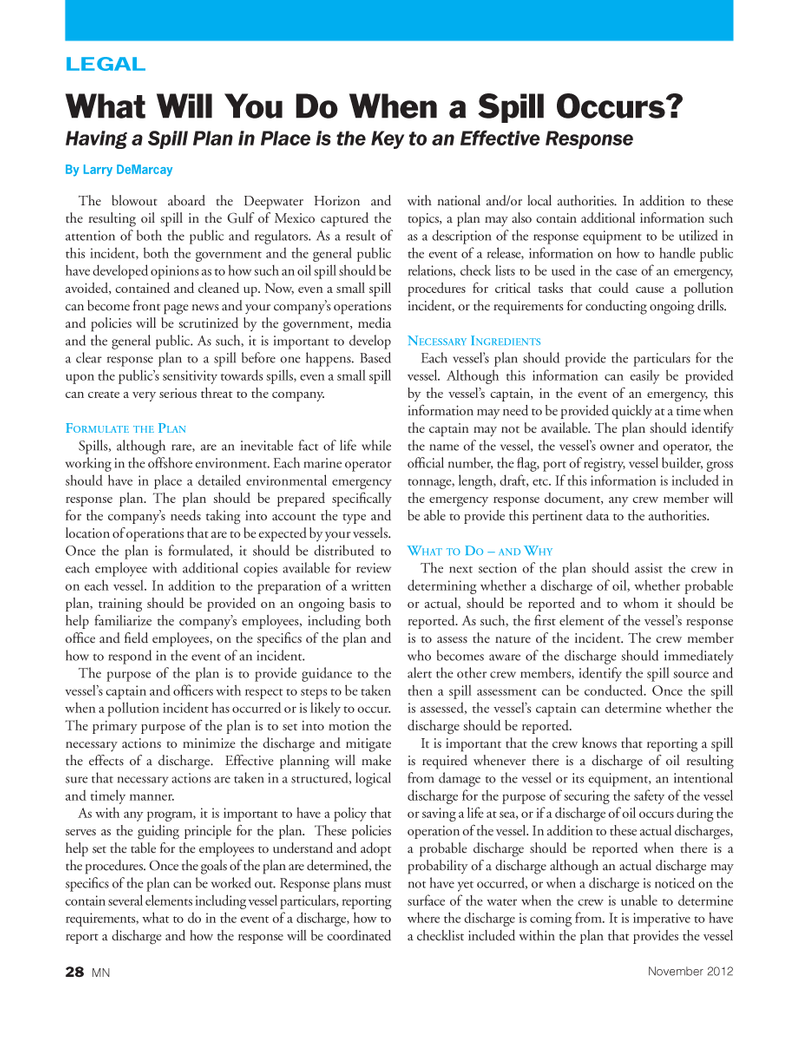
Page 28: of Marine News Magazine (November 2012)
Workboat Annual
Read this page in Pdf, Flash or Html5 edition of November 2012 Marine News Magazine
The blowout aboard the Deepwater Horizon and the resulting oil spill in the Gulf of Mexico captured the attention of both the public and regulators. As a result of this incident, both the government and the general public have developed opinions as to how such an oil spill should be avoided, contained and cleaned up. Now, even a small spill can become front page news and your company?s operations and policies will be scrutinized by the government, media and the general public. As such, it is important to develop a clear response plan to a spill before one happens. Based upon the public?s sensitivity towards spills, even a small spill can create a very serious threat to the company. FORMULATE THE PLAN Spills, although rare, are an inevitable fact of life while working in the offshore environment. Each marine operator should have in place a detailed environmental emergency response plan. The plan should be prepared speci cally for the company?s needs taking into account the type and location of operations that are to be expected by your vessels. Once the plan is formulated, it should be distributed to each employee with additional copies available for review on each vessel. In addition to the preparation of a written plan, training should be provided on an ongoing basis to help familiarize the company?s employees, including both of ce and eld employees, on the speci cs of the plan and how to respond in the event of an incident. The purpose of the plan is to provide guidance to the vessel?s captain and of cers with respect to steps to be taken when a pollution incident has occurred or is likely to occur. The primary purpose of the plan is to set into motion the necessary actions to minimize the discharge and mitigate the effects of a discharge. Effective planning will make sure that necessary actions are taken in a structured, logical and timely manner. As with any program, it is important to have a policy that serves as the guiding principle for the plan. These policies help set the table for the employees to understand and adopt the procedures. Once the goals of the plan are determined, the speci cs of the plan can be worked out. Response plans must contain several elements including vessel particulars, reporting requirements, what to do in the event of a discharge, how to report a discharge and how the response will be coordinated with national and/or local authorities. In addition to these topics, a plan may also contain additional information such as a description of the response equipment to be utilized in the event of a release, information on how to handle public relations, check lists to be used in the case of an emergency, procedures for critical tasks that could cause a pollution incident, or the requirements for conducting ongoing drills. NECESSARY INGREDIENTS Each vessel?s plan should provide the particulars for the vessel. Although this information can easily be provided by the vessel?s captain, in the event of an emergency, this information may need to be provided quickly at a time when the captain may not be available. The plan should identify the name of the vessel, the vessel?s owner and operator, the of cial number, the ag, port of registry, vessel builder, gross tonnage, length, draft, etc. If this information is included in the emergency response document, any crew member will be able to provide this pertinent data to the authorities. WHAT TO DO ? AND WHYThe next section of the plan should assist the crew in determining whether a discharge of oil, whether probable or actual, should be reported and to whom it should be reported. As such, the rst element of the vessel?s response is to assess the nature of the incident. The crew member who becomes aware of the discharge should immediately alert the other crew members, identify the spill source and then a spill assessment can be conducted. Once the spill is assessed, the vessel?s captain can determine whether the discharge should be reported. It is important that the crew knows that reporting a spill is required whenever there is a discharge of oil resulting from damage to the vessel or its equipment, an intentional discharge for the purpose of securing the safety of the vessel or saving a life at sea, or if a discharge of oil occurs during the operation of the vessel. In addition to these actual discharges, a probable discharge should be reported when there is a probability of a discharge although an actual discharge may not have yet occurred, or when a discharge is noticed on the surface of the water when the crew is unable to determine where the discharge is coming from. It is imperative to have a checklist included within the plan that provides the vessel LEGALWhat Will You Do When a Spill Occurs? Having a Spill Plan in Place is the Key to an Effective Response By Larry DeMarcay November 201228 MNMNNov2012 Layout 18-31.indd 28MNNov2012 Layout 18-31.indd 2810/26/2012 11:53:41 AM10/26/2012 11:53:41 AM

 27
27

 29
29
